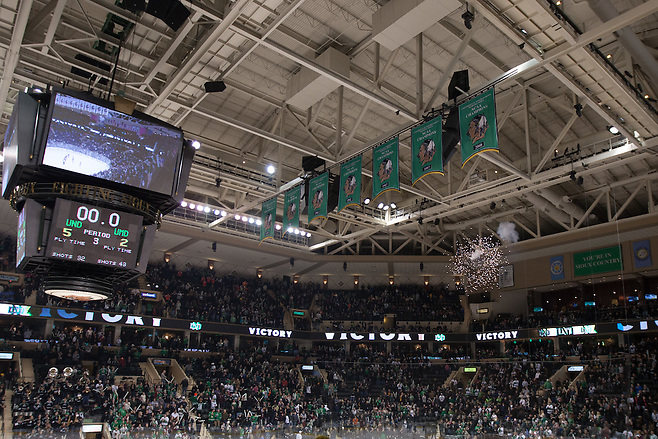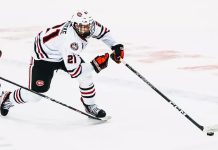
Prep work to get arguably the best facility in college hockey ready for a rearranged conference tournament is nearly complete.
The Ralph Engelstad Arena (REA) in Grand Forks, N.D., is just about good to go for this year’s NCHC Frozen Faceoff. New center-ice signage was installed late last week, and after the last team practice this Thursday evening, new graphics will be installed on the rink’s dasher boards.
The Frozen Faceoff, which would normally take place in St. Paul, Minn., was moved last month to Grand Forks, with a single-elimination format utilized. Other changes in this pandemic-affected postseason include nixing for this year of the usual best-of-three first-round series as well as the NCHC’s third-place game.
The tournament begins Friday afternoon when second-seeded St. Cloud State faces No. 7 Colorado College. The four quarterfinal games will be split over Friday and Saturday, with semifinal games taking place next Monday ahead of Tuesday’s championship game.
In some ways, the reworked Frozen Faceoff will mirror the NCHC’s season-opening pod that took place in December at Omaha’s Baxter Arena. With active case numbers plummeting recently in Grand Forks County as well as the rest of North Dakota, Hodgson is optimistic that the Frozen Faceoff in Grand Forks will be as big of a success as the Omaha pod was.
“There’s been a great amount of collaboration between the membership that took part in the Omaha pod, as well as (league commissioner) Josh Fenton and the leadership of the NCHC,” REA general manager Jody Hodgson told USCHO on Wednesday.
“They were intimately involved in the Omaha event and intimately involved in the (Frozen Faceoff) event, so certainly they did a fantastic job in Omaha, and we’re going to try to replicate that here.”
One big difference between the Frozen Faceoff and the Omaha pod is that fans will be involved at REA.
Up to 3,000 will be permitted to attend each of the tournament’s seven games. The games are divided into their own sessions, which means fans will leave and re-enter the building with a different ticket on event days with two games. This will allow for cleaning crews to do their work ahead of each new game.
North Dakota and REA officials originally planned for a season without fans in attendance, as was the case in the NHL’s 2020 playoff bubbles and elsewhere in the world of sports. It was later decided that up to 1,000 fans would be allowed in for UND’s first home game of this season, but after the Fighting Hawks’ first two home dates were postponed, 2,008 fans attended UND’s home opener Jan. 23 against Colorado College. Attendance limits had been upped to 2,500 by then.
“We think it went really well,” Hodgson said of reintroducing spectators to REA. “We think our fans enjoyed the experience, and we had a limited number of them so we’re set at 3,000 for a maximum capacity for the Frozen Faceoff.
“We think it’s a really good balance when we try to create the type of student-athlete experience we seek, and also provide fans the opportunity to be part of the event. Certainly it’s a bit of a balancing act, but we think we’ve struck the right chord with it.”
REA, which normally holds a capacity of 11,634 fans, will keep its on-site mask mandate intact through the Frozen Faceoff, even though Grand Forks County rescinded its own mandate this Monday. The county’s mask mandate was put into place around two months ago as a statewide mandate expired.
“Our COVID-19 health and safety protocols are going to remain unchanged through the Frozen Faceoff, and it’s an awesome thing, in my opinion, that Grand Forks County has gotten to the point where they can rescind the mask mandate,” Hodgson said. “That means we’re headed in the right direction and the (active case) numbers are really low in our community.
“Those are great things for the Frozen Faceoff as well as for our community at large, but I do think it is our responsibility to honor the commitment we made to the NCHC and their member institutions, the student-athletes, coaches and staff and all the (university) presidents and everybody that decided to bring the event to Grand Forks. They did so under the belief that we would have fans in the building, but that we would require those fans to wear masks when they’re here. The whole event will continue to be a masked event, even though the county has rescinded the community’s mask mandate.
“We think we need to honor the commitment to the conference, to the fans,” Hodgson continued. “People purchased tickets prior to the change in that mask mandate, so there’s a certain portion of the population that still expects us to create the environment that existed when they bought their tickets.”
Hodgson was asked Wednesday how arena officials plan to enforce the facility’s mask mandate, even with the county’s own mandate no longer in place.
“Just through encouragement, would be the honest answer,” he said. “It’s through our staff communicating with people and trying to be respectful, but encouraging people and reminding people that that policy does exist, and just doing as good a job as we can of balancing that out.
“We don’t seek to be confrontational and we don’t seek to take away from people’s enjoyment of the event, but we do have a policy in place, and as such, it’s our requirement to try and enforce that as best we can.”
Hodgson said that ticket sales for the Frozen Faceoff are going well, despite the duration and single-elimination format affecting the travel experience that the tournament normally provides.
A significant majority of tickets are expected to be purchased in and around Grand Forks, and there has been more demand for North Dakota’s quarterfinal game Friday against Miami than there has been for the other three opening-round games. Single-game tickets are now being sold for the quarterfinals, but single-game tickets are not yet available for the semifinals and final.
Just about all applicable ducks are in a row at this point, and carrying on from the success of the Omaha pod, Hodgson is eager to get started with what could be a once-in-a-lifetime type of tournament experience in Grand Forks.
“I just think they did a really, really thorough job in Omaha,” Hodgson said. “If I were to identify something that we’d like to do and replicate, we’d like to make sure that all games get played and we’d like to make sure everybody stays healthy and safe, and that we create the type of safe event that everybody wants to have to conclude the season.”
One more thing
This is my last NCHC column of the season. I’ll be back on the site soon, though. I have a few more NCHC game picks to be wrong about — everybody’s good at something — and I’ll also have a feature coming up on a Hockey Humanitarian Award finalist. Those are easily among my favorite stories to write whenever I get the opportunity, so I hope you’ll enjoy this year’s.
Anyway, to end my last league column each season, I take time to thank my family, friends, my editor here at USCHO and you, our readers. If you’ve been here with us long enough, you should all know how that goes and how much I appreciate you.
This time, though, I want to focus on something else.
Candace Horgan has been my writing partner here at USCHO for as long as the NCHC has been around, since the fall of 2013. It’s wild to think we’ve been working together that long, but back then, we also couldn’t have had the foggiest idea of what the 2020-21 season would be like.
Deep down, I think we all knew that COVID-19 would have an effect on this season, just as the pandemic did last season with the cancellation of the college hockey postseason and the NCAA’s spring sports championships. With that in mind, Candace opened our NCHC season preview in November by expressing trepidation over this college hockey season even happening. I fully shared her view, and I’ve never been more proud to be involved in our partnership than when that article went live.
The last year and change has been challenging for all of us. I won’t presume to speak for Candace, but while I feel incredibly fortunate not to have lost anyone I know to COVID-19, living 10 hours away from nearly anyone I knew before I moved to north-central North Dakota, I haven’t seen any of my family members in person for going on 15 months. That’s not easy to process.
I think back to my column earlier this season on Western Michigan senior Ethen Frank, from Papillion, Neb., about 20 minutes from where I grew up in Omaha. I wrote that story just after the NCHC’s season-opening pod in Omaha came to an end, and in speaking with Ethen, I felt incredibly jealous that he was able to be home during the holiday period.
I’m grateful to him for sharing his story, though, just as I am to Candace for everything I’ve learned from her. She works harder here than I could ever claim to. She crushes it every time with her NCHC coverage, and she has also been a huge proponent of women’s college hockey, something that is criminally undervalued.
This website, and college hockey in general, are infinitely better for your presence, Candace. Thank you.


